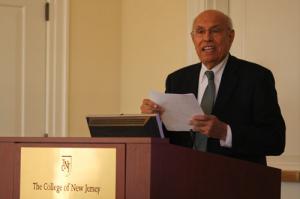Noted Alumnus Lectures on “Post 9/11 Perceptions of the U.S. on the Arab/Muslim Street”
Yassin El-Ayouty ’53, PhD, drew on 50 years of experience as a diplomat for the United Nations, a law professor, and an attorney specializing in transnational law when speaking of the “calamitous” effects of his adoptive country’s foreign policy choices following the attacks on Sept. 11, 2001.


Yassin El-Ayouty ’53, PhD, the noted diplomat and legal scholar, summoned up the starry-eyed newcomer’s sense of freshness and wonder as he regaled an audience here in late March with an account of his arrival on campus as a Fulbright scholar from Egypt more than half a century ago.
The College was, as he put it, his “first and everlasting alma mater in the U.S.” securing him introductions to President Harry Truman, General Dwight Eisenhower and Albert Einstein, setting him on a dazzling career path and instilling in him a love of this country’s mobile and open society—including co-education.
Indeed, El-Ayouty recounted how he decided to “make the great USA my home” just months after arriving on campus here as a young teacher in the fall of 1952.
But it was a more nuanced perspective, from his more than 50-year career as a diplomat for the United Nations, a law professor, and an attorney specializing in transnational law, that informed his talk, “Post 9/11 Perceptions of the U.S. on the Arab/Muslim Street.” And it was as a frustrated citizen of this country, with professional and personal ties around the globe, that he spoke of the “calamitous” effects of his adoptive country’s foreign policy choices following the attacks on Sept. 11, 2001.
“America’s essential genius, which emanates from its great founders, is its Constitution, with its magnificent system of checks and balances,” El-Ayouty said, adding that “America has staunchly stood for human rights, the rule of law and the right to self-determination … this has been America as perceived by the entire world, including the 1.5 billion people who call themselves Muslims.”
He recalled his crushing disappointment at seeing the Constitution trampled in what he described as a misguided response to an attack “at the hands of a gang of criminals.”
He noted the expansion of executive authority, the capture and imprisonment of suspects held without charges, the accounts of torture and inhuman treatment at the hands of U.S. personnel, the policy of extraordinary rendition, the removal of terror suspects to secret locations outside of the U.S., and the treatment of Muslims in this country and elsewhere as “prima facie suspects.” Lastly, he noted the massive loss of civilian life in Iraq, something he has witnessed firsthand on his many recent trips to the country.
“The U.S. war on terror became a U.S. war on law,” he said. “The only beneficiaries of that transformation were the enemies of the U.S., the enemies of Israel, and in a broad sense, the enemies of Islam, which has been catastrophically misunderstood as propagating terror and enmity towards non-Muslims.”

El-Ayouty recently aided in the legal defense of a Pulitzer Prize-winning Iraqi photojournalist, Bilal Hussein, who was held by the U.S. military for nearly two years under suspicion of aiding insurgents. He and other lawyers working on the case secured the man’s release last year.
“I witnessed how Iraq was destroyed, economically and socially, without any tangible benefit to U.S security,” he said.
Over the past decade he has also traveled extensively throughout the Muslim and Arab world with SUNSGLOW, an organization he founded a decade ago as a vehicle to help train judicial and legal communities in what he calls “emerging systems” in the developing world. Despite some bitterness in these regions toward the U.S. government, he feels the current administration has an opportunity to win back hearts and minds that were never entirely lost.
Indeed, El-Ayouty said he is counting on the Obama administration to “rebuild shattered bridges” and to fight terrorism “not largely unilaterally, but as a globalized affair.”
“The hurt is deep, but the original foundations of goodwill toward the American people have never been erased in spite of the calamities of the last eight years,” he said.
Look for an in-depth profile of Yassin El-Ayouty and his work in a future issue of TCNJ Magazine.
Posted on April 10, 2009

